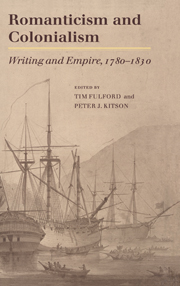Book contents
- Frontmatter
- Contents
- Notes on contributors
- Acknowledgements
- 1 Romanticism and colonialism: texts, contexts, issues
- 2 Romanticism and colonialism: races, places, peoples, 1785–1800
- 3 Romanticism and colonialism: races, places, peoples, 1800–1830
- 4 Accessing India: Orientalism, anti-‘Indianism’ and the rhetoric of Jones and Burke
- 5 ‘Sunshine and Shady Groves’: what Blake's ‘Little Black Boy’ learned from African writers
- 6 Blood Sugar
- 7 ‘Wisely forgetful’: Coleridge and the politics of Pantisocracy
- 8 Darkness visible? Race and representation in Bristol abolitionist poetry, 1770–1810
- 9 Fictional constructions of Liberated Africans: Mary Butt Sherwood
- 10 ‘Wandering through Eblis’; absorption and containment in Romantic exoticism
- 11 The Isle of Devils: The Jamaican journal of M. G. Lewis
- 12 Indian Jugglers: Hazlitt, Romantic Orientalism, and the difference of view
- 13 ‘Some samples of the finest Orientalism’: Byronic Philhellenism and proto-Zionism at the time of the Congress of Vienna
- 14 ‘Once did she hold the gorgeous East in fee…’: Byron's Venice and Oriental Empire
- 15 The plague of imperial desire: Montesquieu, Gibbon, Brougham, and Mary Shelley's The Last Man
- Index
1 - Romanticism and colonialism: texts, contexts, issues
Published online by Cambridge University Press: 20 August 2009
- Frontmatter
- Contents
- Notes on contributors
- Acknowledgements
- 1 Romanticism and colonialism: texts, contexts, issues
- 2 Romanticism and colonialism: races, places, peoples, 1785–1800
- 3 Romanticism and colonialism: races, places, peoples, 1800–1830
- 4 Accessing India: Orientalism, anti-‘Indianism’ and the rhetoric of Jones and Burke
- 5 ‘Sunshine and Shady Groves’: what Blake's ‘Little Black Boy’ learned from African writers
- 6 Blood Sugar
- 7 ‘Wisely forgetful’: Coleridge and the politics of Pantisocracy
- 8 Darkness visible? Race and representation in Bristol abolitionist poetry, 1770–1810
- 9 Fictional constructions of Liberated Africans: Mary Butt Sherwood
- 10 ‘Wandering through Eblis’; absorption and containment in Romantic exoticism
- 11 The Isle of Devils: The Jamaican journal of M. G. Lewis
- 12 Indian Jugglers: Hazlitt, Romantic Orientalism, and the difference of view
- 13 ‘Some samples of the finest Orientalism’: Byronic Philhellenism and proto-Zionism at the time of the Congress of Vienna
- 14 ‘Once did she hold the gorgeous East in fee…’: Byron's Venice and Oriental Empire
- 15 The plague of imperial desire: Montesquieu, Gibbon, Brougham, and Mary Shelley's The Last Man
- Index
Summary
The publication in 1983 of Jerome J. McGann's The Romantic Ideology precipitated a return to historical and political readings of the Romantic period. Critics began to analyse ideas of ideology, class and gender in an attempt to deconstruct previous notions of ‘Romanticism’ as a mainly aesthetic and literary movement amongst five canonical, male poets. Much effort has been made to return Romantic discourse to the contexts in which it was written and read – the ‘actual literary communities as they functioned within their larger communities of time and space’. As a result, it is now accepted that it is impossible to understand writing in the period without examining political responses to the French Revolution and the numerous texts (many of them by women and many far more popular at the time than the work of Wordsworth, Coleridge, Shelley, Blake or Keats) which were excluded from the canon.
Given these critical developments, it is surprizing that, with some recent exceptions, Romanticism's relationship with colonialism has been relatively little studied, although a wealth of critical writing has been devoted to the connection between both early modern and nineteenth-century literature and the histories of colonialism and imperialism. Significantly, the most sustained critical attention to the issues of colonialism and literature in the period has been afforded to the novels of Jane Austen in Edward Said's noted analysis of Mansfield Park (1814) which considers Sir Thomas Bertram's source of wealth in his plantations in Antigua in relation to the domestic values of home and hearth which the novel endorses.
- Type
- Chapter
- Information
- Romanticism and ColonialismWriting and Empire, 1780–1830, pp. 1 - 12Publisher: Cambridge University PressPrint publication year: 1998
- 2
- Cited by



